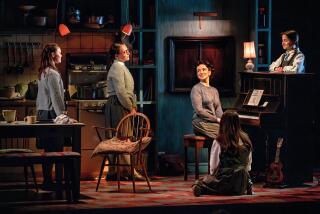Review: A family tries to close the distance between ‘Other Desert Cities’ at the Theatricum
Jon Robin Baitz has never been afraid of putting politics onstage. He has a gift for channeling current events into complex and nuanced plays, practically in real time.
His dark comedy “Vicuña,” which ran at L.A.’s Kirk Douglas Theatre during the 2016 election, depicted the triumph of a presidential candidate a lot like Donald Trump. The outcome of Nov. 10 transformed the production mid-run from an antic cautionary tale to uncanny prophecy.
The risk of plays about hot-button issues is that they may age poorly. So as I drove out to Topanga for a revival of Baitz’s 2012 Pulitzer Prize finalist “Other Desert Cities” at Will Geer’s Theatricum Botanicum, I couldn’t help wondering whether this family-reunion drama and allegory of the American political landscape — which I saw in 2011 at the Mark Taper Forum — had staled over the past six years.
The story takes place in 2004 at the Palm Springs house of a retired GOP power couple, Lyman and Polly Wyeth. Lyman (Mark Bramhall) was a leading man in Hollywood shoot’em-ups before becoming an ambassador under his friend and mentor President Reagan. Polly (Ellen Geer), a former screenwriter, supported her husband’s political career in a formidable style modeled on Nancy Reagan’s.
Their two troubled adult children, Brooke (Willow Geer) and Trip (Rafael Goldstein), are Gen-X liberals. Polly’s alcoholic sister Silda (Melora Marshall), who is staying with them after a stint in rehab, is a dyed-in-the-wool ’60s leftie.
(You can tell how the women vote not only by their dialogue but, in this production, by their hair: Polly wears hers in a steely helmet; Silda’s is stuck back in the Summer of Love; Brooke’s gets twisted up in the haphazard knot of a depressive postgrad. Vicki Conrad’s costumes are equally well chosen.)
Politics aside, these bright, witty people love each other and are hoping for a Christmas Eve as bland and flat as the desert outside (not in evidence at Theatricum’s woodsy outdoor stage, but easy to imagine). Of course, with so much seismic activity under the sand, it doesn’t take long for cracks to appear.
Brooke has brought the manuscript of her soon-to-be-published book for her family to read. It’s not a novel, as she has led them to believe, but a memoir recounting a tragedy from her childhood. Brooke’s need to rehash this painful history clashes with Polly and Lyman’s desperation to repress it, provoking an Act 2 revelation that shatters the family’s carefully constructed image. Not having been able to forget this twist — it’s a doozy — I feared that the story wouldn’t engage me as deeply a second time.
I needn’t have worried. On the metaphorical level, Baitz’s depiction of the state of American politics in the early part of the century seems more clear-eyed, even prescient, in light of events he couldn’t have predicted (or did he?).
The members of the Wyeth family are fully fleshed individuals, obviously fun for actors to inhabit, but they’re also representatives of our political parties and the ways they have failed us. The old-school Republicans, Lyman and Polly, have buried their heads in the sand, blindly loyal to tradition, refusing to acknowledge that their party has changed. (The play’s title, “Other Desert Cities,” refers to a sign on the freeway en route to Palm Springs, but also to the war in Iraq, off in another, unseen desert.) The ’60s liberals, represented by Silda, are sickly and feeble, clinging to a long-dead dream. The Democrats of the younger generation, Brooke and Trip, have been kept so deeply in the dark about the past that they can’t understand the present.
The schism between the two parties today certainly doesn’t invalidate Baitz’s analysis. And is it a coincidence that the movies Polly and Silda are said to have written together in the ’50s and ’60s feature a plucky, Gidget-like heroine named Hillary?
Dramatically, the play presents some challenges to directors. The first act consists almost entirely of exposition, catching the audience up on the characters’ complex back stories; the second act leaves several of them on the stage for long periods without much to do. Furthermore, characters this colorful tend to invite such hammy performances that the Wyeths don’t always appear to be related. But director Mary Jo DuPrey builds a mounting tension in her cast that gets them through the slower bits, and they’re persuasive not just as individuals but as a family. It helps that Ellen Geer really is Willow Geer’s mother and Melora Marshall really is her aunt. Bramhall and Goldstein are such reliable presences on L.A. stages that they might as well be kin.
If I’ve made the plot sound depressing, it’s because I’ve been trying to avoid spoilers. In fact there is a strong current of optimism in “Other Desert Cities” — the hope that warring parties will remember that they are part of a single family and treat one another with compassion.
♦ ♦ ♦ ♦ ♦ ♦ ♦ ♦ ♦ ♦
‘Other Desert Cities’
Where: Will Geer’s Theatricum Botanicum, 1419 N. Topanga Canyon Blvd., Topanga
When: 3:30 or 7:30 p.m. on select Saturdays and Sundays through Sept. 30; see website for schedule
Tickets: $38.50
Information: (310) 455-3723 or www.theatricum.com
Running time: 2 hours, 25 minutes
SIGN UP for the free Essential Arts & Culture newsletter »
Support coverage of the arts. Share this article.
ALSO
Times art critic Christopher Knight’s latest reviews
Times theater critic Charles McNulty’s latest reviews
Times architecture critic Christopher Hawthorne’s latest columns
Times music critic Mark Swed’s latest review
More to Read
The biggest entertainment stories
Get our big stories about Hollywood, film, television, music, arts, culture and more right in your inbox as soon as they publish.
You may occasionally receive promotional content from the Los Angeles Times.










